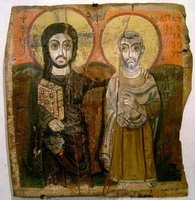Reformed Theology is Left Behind
 During seminary I began to move slowly away from Reformed theology. I began to see that there are more than two views of predestination. In most Reformed circles it is believed that a person is either a Calvinist or an Arminian. What I discovered through my own reading is that there are many, many different views of predestination. There is the Augustinian view, the St. Maximus view, the Scotist view, the Thomist view, the Molinist view, the Lutheran view, the open theism view and on it goes.
My initial doubts of Calvinistic predestination began while I was translating Romans 9 from the Greek. I discovered that the context of Romans 9 is not about individual election but corporate election. St. Paul in Romans 8 is answering the Jews who are asking why God has abandoned His people for the Christian Church, the new Israel. The Jews were claiming that this is not fair. Romans 9 is St. Paul's answer to the complaint of the Jews. Also, I was reading a commentary on the 39 Articles of Religion by Edward Harold Brown who called this corporate view of election, "ecclesiastical election". This was amazing to me since I had come to the same conclusion in my own study of predestination. Peter Kreeft's commentary on Aquinas' Summa was helpful in understanding predestination in the context of providence which includes free will. I think this is also the view of Richard Hooker.
I began to see God's love for all mankind in a richer way. Another book by Peter Kreeft that was helpful in seeing a more loving God than the Calvinist God was Knowing the Truth of God's Love. The updated version is now titled The God Who Loves You. If God is love (agape) then how can He not desire all to be saved? St. Maximus the Confessor brings more light to predestination when he says that God predestines natures not persons. In Him, in Christ, we are saved by joining our nature to His. St. Athanasius said, "God became man that man might become god." That is what God has predestined before the foundation of the world. The Love of God is strongly emphasized in the Orthodox Church.
During seminary I began to move slowly away from Reformed theology. I began to see that there are more than two views of predestination. In most Reformed circles it is believed that a person is either a Calvinist or an Arminian. What I discovered through my own reading is that there are many, many different views of predestination. There is the Augustinian view, the St. Maximus view, the Scotist view, the Thomist view, the Molinist view, the Lutheran view, the open theism view and on it goes.
My initial doubts of Calvinistic predestination began while I was translating Romans 9 from the Greek. I discovered that the context of Romans 9 is not about individual election but corporate election. St. Paul in Romans 8 is answering the Jews who are asking why God has abandoned His people for the Christian Church, the new Israel. The Jews were claiming that this is not fair. Romans 9 is St. Paul's answer to the complaint of the Jews. Also, I was reading a commentary on the 39 Articles of Religion by Edward Harold Brown who called this corporate view of election, "ecclesiastical election". This was amazing to me since I had come to the same conclusion in my own study of predestination. Peter Kreeft's commentary on Aquinas' Summa was helpful in understanding predestination in the context of providence which includes free will. I think this is also the view of Richard Hooker.
I began to see God's love for all mankind in a richer way. Another book by Peter Kreeft that was helpful in seeing a more loving God than the Calvinist God was Knowing the Truth of God's Love. The updated version is now titled The God Who Loves You. If God is love (agape) then how can He not desire all to be saved? St. Maximus the Confessor brings more light to predestination when he says that God predestines natures not persons. In Him, in Christ, we are saved by joining our nature to His. St. Athanasius said, "God became man that man might become god." That is what God has predestined before the foundation of the world. The Love of God is strongly emphasized in the Orthodox Church.

<< Home